Sourdough Benefits: Unravel the Truth and Myths
The touted benefits of sourdough are endless! Post after post hails nothing but praise for sourdough benefits! Sourdough bread is all the craze right now! Just thinking about that chewy, crusty, tangy bread coming straight out of the oven makes me want to go eat a whole loaf slathered in butter. On top of that, did I mention there is a boatload of health benefits?!!!… Right?… Don’t the experts say that?… The top-ranking Google search posts could not possibly be wrong… or could they?
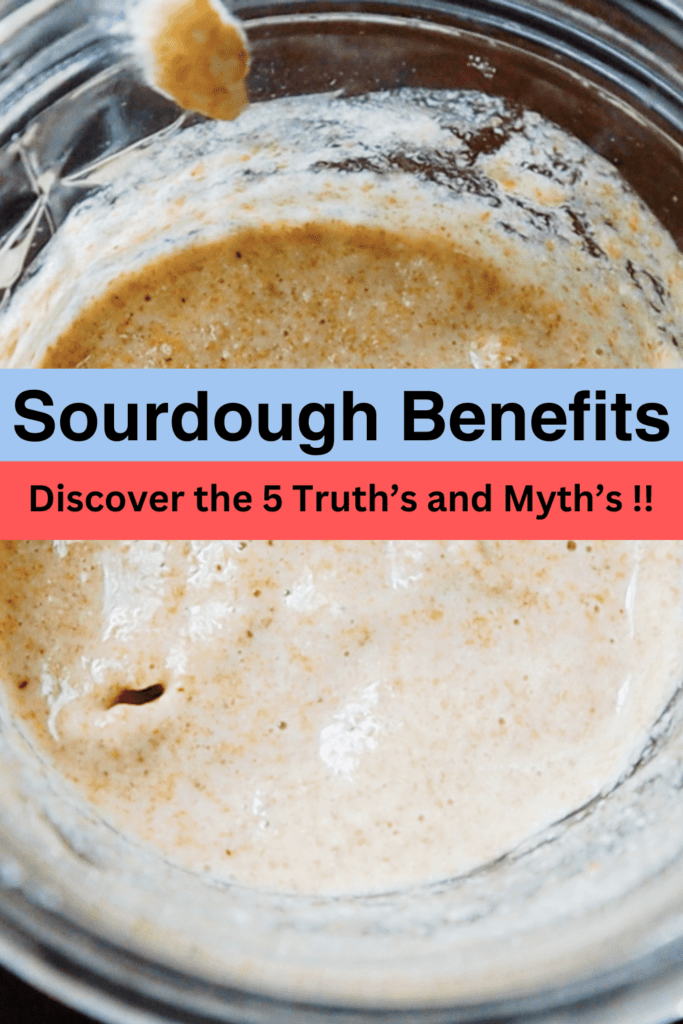
Now..Now.. Don’t get your panties in a bunch ladies! I’m not saying that sourdough is bad or that you are feeding your children unhealthy, poisonous foods. What I am saying is that the “experts” are not scientists and they may not understand the words that they speak… or the boring sciencey information that they are throwing out into the internet universe. Without further ado, let’s dispel some myths and talk about the true benefits of sourdough!
Let’s play a game of SOURDOUGH BENEFITS: MYTH OR TRUTH
Sourdough Benefits #1: Sourdough is less work to digest because the bacteria/ yeast break down starches before they reach your stomach. Truth or Myth?
MYTH: While it is true that sourdough is easier to digest, the reasoning is completely off base. First of all, Amylase, an enzyme already present in the wheat grain, breaks down the starches in the flour and converts them into a sugar molecule known as maltose and then more enzymes convert the maltose sugar molecule into another sugar molecule known as glucose. Bacteria and yeast do not break down the starches. The bacteria/ yeast do eat the newly created sugar molecules and convert them into acids, alcohol, and Carbon Dioxide.
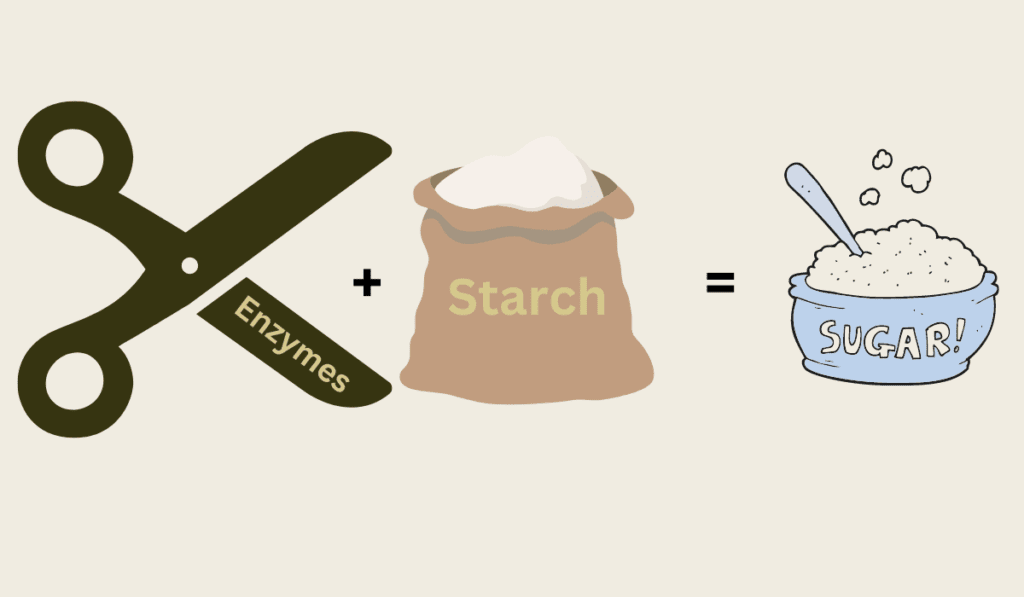
Wait! Wait! Wait you say? This means that the bacteria/ yeast predigest the starches. So, this claim has to be true! The truth is, that the body does not need help to digest starch. Enzymes quickly dissolve starch the moment that it touches your mouth. Matter of fact, breaking down starch is probably the easiest process that your stomach performs. Honestly, It may be a little too good at digesting sugar sometimes. Additionally, starches are not the main troublemakers when it comes to digestion problems. We will discuss this idea further in this post.
Sourdough Benefits #2: Sourdough has a low glycemic index and is great for diabetics. That is because the yeast has already eaten all of the sugar. Truth or Myth?
TRUE: It is true that Sourdough has a lower glycemic index (53 GI) than both whole wheat (70) and white bread (75). Let us discuss why there is a difference in glycemic index. If you would like to read more about glycemic index see this article published by MedicalNewsToday
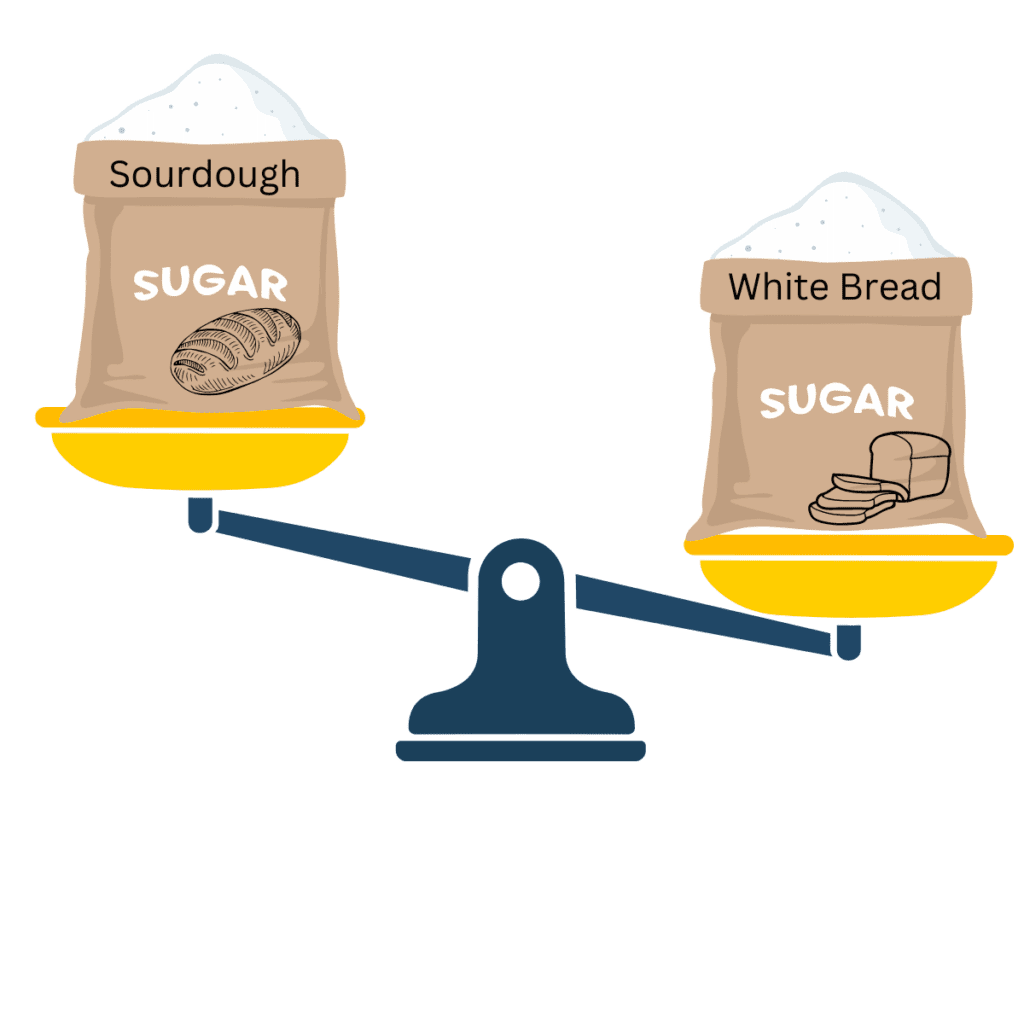
When you eat regular white or whole wheat bread, the bread contains a lot of sugar molecules (rapidly dissolvable starch) that are just waiting for you to eat them. The body breaks down the starch super quickly. In turn, this causes a huge spike of sugar straight into the human bloodstream. Of course, this is a problem for diabetic individuals who cannot properly process the sugar. Fortunately, during the fermentation process of sourdough, the yeast/ bacteria eat up a huge amount of sugar molecules before baking. This means that there is less sugar in sourdough bread than regular yeast breads
Additionally, the acetic acid that the sourdough bacteria produce can reduce how quickly the stomach empties into the small intestine. Consequently, the reduction in stomach emptying time causes the absorption of sugar to slow down. The effects are even better if the sourdough flour is whole wheat. Since whole wheat flour contains a boatload of digestion-resistant starch also known as fiber. The fiber also helps to slow down the emptying of the stomach.
To make a long story short, sourdough has less sugar than white bread. Additionally, sourdough can slow down the absorption of sugar into the bloodstream.
Sourdough Benefits #3: Sourdough provides healthy bacteria, also known as probiotics, to your diet. Thus, helping to improve your gut health. Truth or Myth?
Myth: Oh boy! This is a shocker, I know! I hear this claim about sourdough benefits over and over again. So, let us talk about why this is a big fat myth!
It would not be far-fetched to believe that sourdough provides the body with probiotics. Sourdough is literally created by good gut bacteria (probiotics) known as lactobacillus bacteria. Think of the common probiotics in yogurt. Yep, that is the same little guys in your sourdough!
The reason that this belief is wrong is that we do not eat raw sourdough! Sourdough is a baked good. As matter of a fact, it is baked at extremely high temperatures. Lactobacillus bacteria can not even survive in hot water let alone the oven. Therefore, all of the probiotics in sourdough get killed off the moment that the dough is baked.
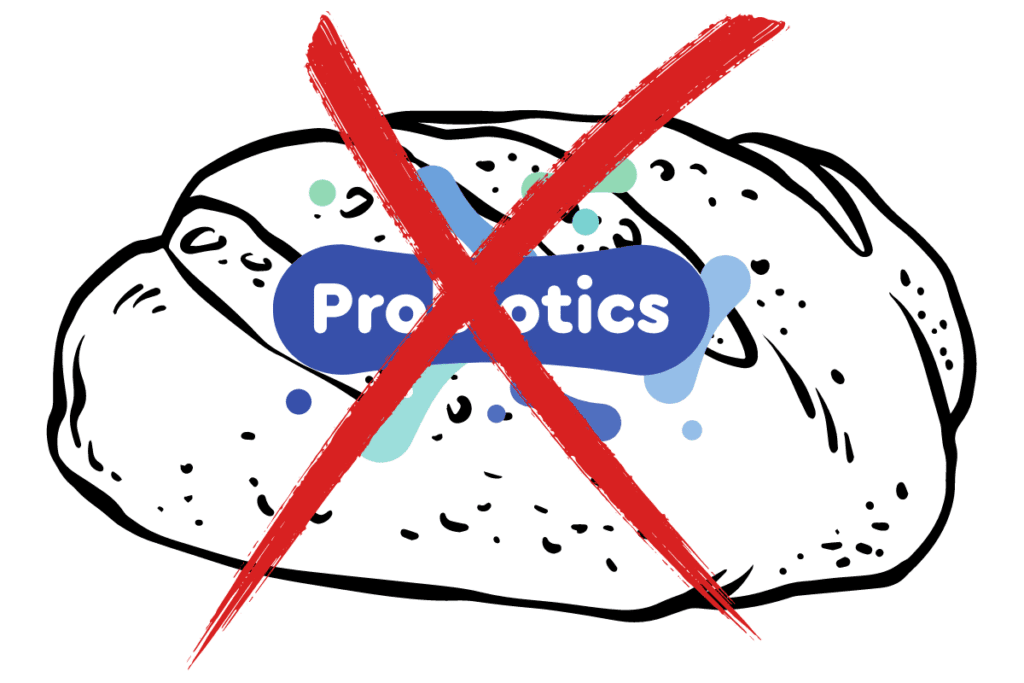
*ALL PROBIOTICS DIE WHEN COOKED*
Fortunately, not all is lost when the good bacteria die. The bacteria have a new function in the body, as Pre-Biotics. Essentially, they are now food for the bacteria that live in your gut.
This is the takeaway here: Yes, sourdough is great for gut health but not because it contains probiotics.
Sourdough Benefit #4: Individuals with gluten sensitivities digest sourdough better because it breaks down gluten. Truth or Myth?
Sort of True: To understand this answer you must understand gluten, how it is formed, and how it breaks down. Gluten, a protein, is the combination of 2 different proteins Gliaden and Gluten. When you add water to wheat flour it causes the 2 proteins to stick together, thus creating Gluten. Gluten is what gives bread its structure, without it the bread falls apart.
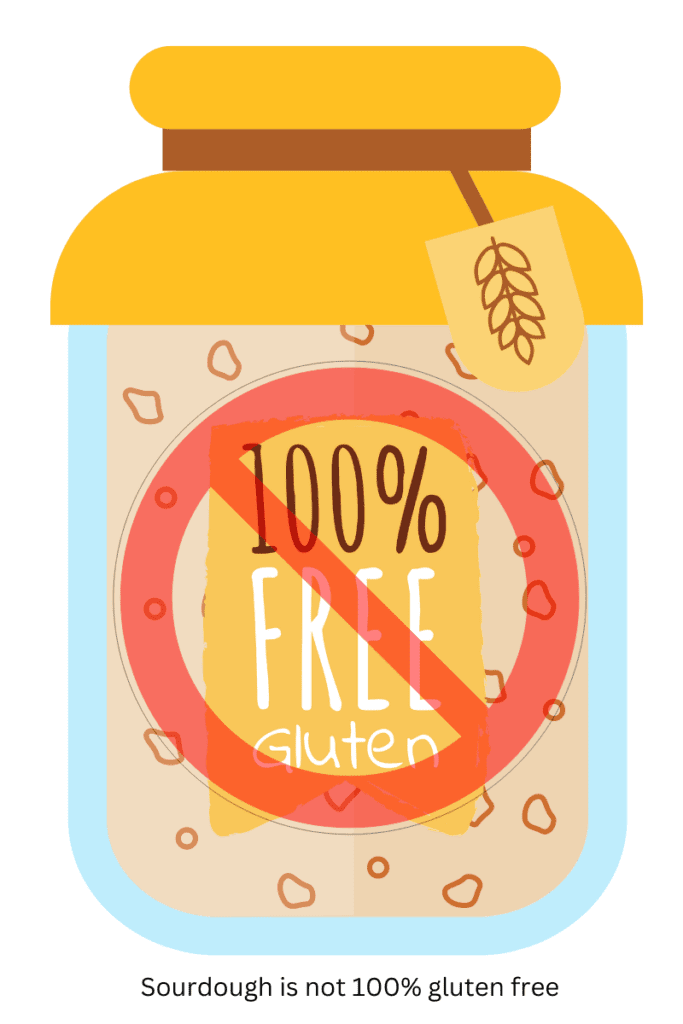
With that said, over time there is an enzyme known as protease that will begin to break down the gluten. In prolonged fermentation, there is a reduction in gluten but there is still a presence of it in the bread. Sourdough fermentation does not completely eliminate Gluten. Therefore those with celiac disease and allergies to gluten will still have issues if they consume sourdough bread.
*While we are talking about those who should avoid sourdough, let’s put this out there too- If you are on antidepressants known as MAO inhibitors it is not a good idea to consume sourdough bread. Sourdough contains high amounts of an amino acid called Tyramine. This may cause you to have problems with high blood pressure. For further reading check out this article from the Mayo Clinic.
Sourdough Benefit #5: Sourdough bread has more Lactic Acid that leaves less room for phytic acid, and increases digestibility, and nutritional availability. Truth or Myth?
Myth/ Truth: There are a lot of different ideas to address in this statement.
- Lactic acid does not push out phytic acid. Lactic acid and acetic acid produced by the lactobacillus bacteria create an acidic environment in which bad bacteria and molds cannot thrive. Basically, the acidic environment helps to protect/ preserve the sourdough from unhealthy, disease-causing, invaders. Click here to learn more
- The acidic environment during sourdough fermentation does encourage an enzyme, known as phytase, to activate and break down the phytic acid present in the flour. Phytic acid binds to the healthy nutrients and minerals present in the wheat grain. Unfortunately, humans do not have the capability of breaking down the phytic acid. Consequently, this causes a lot of discomfort in the digestive system. In addition, the nutrients are not normally available to be absorbed by the human body. When phytase breaks down the phytic acid, it releases the healthy nutrients and makes them available for humans to easily digest. This process, in itself, makes sourdough way more healthier and easier to digest than commercial white bread.
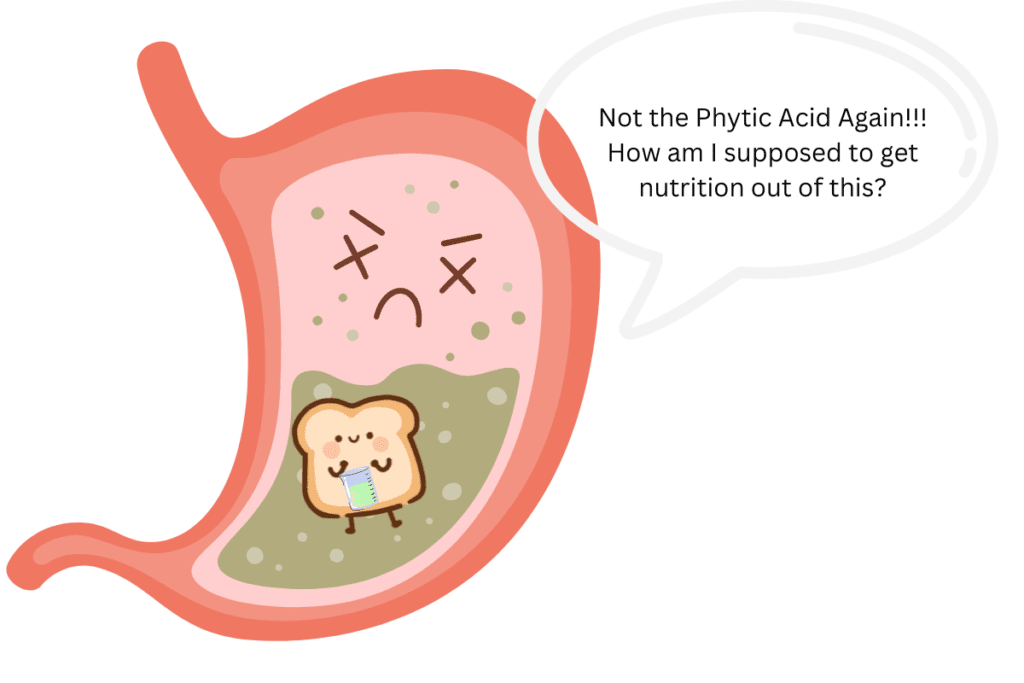







So informative! Thanks for sharing!
Very interesting! I have definitely heard many of those myths and assumed that they were true. 🙂
Great information!
Thank you! I hope it was beneficial for you!